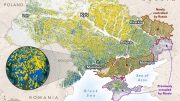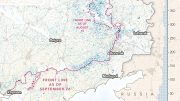
With a world facing the consequences of climate change, climate-resilient crops are becoming increasingly critical. By having crops that can withstand extreme environmental stressors, food security is improved, as farmers are able to grow crops even in challenging conditions. This, in turn, helps to address the issue of global hunger, as food production remains stable even in the face of a changing climate.
The incorporation of exotic DNA from wild relatives into wheat results in a remarkable yield increase of up to 50%, even in hot weather, surpassing elite lines without these genes.
Amid a year of record-breaking temperatures, research from the Earlham Institute in Norwich and the International Maize and Wheat Improvement Centre (CIMMYT) provides much-needed hope for enhancing crop resilience and securing food in the face of a changing climate.
The field trials in Mexico also emphasize the importance of genetic diversity in key crops, where decades of selective breeding have reduced their ability to adapt to a rapidly warming planet.
There is growing uncertainty around the ability of major food crops to continue to meet global demand as temperatures rise and weather events become more extreme.
Wheat provides more global calories than any other crop yet most of the wheat grown around the world has limited genetic variation, making it vulnerable to the impacts of climate change.
“Wheat is responsible for around 20 percent of the calories consumed globally and is widely grown all over the world,” says Professor Anthony Hall, study author and Group Leader at the Earlham Institute. “But we don’t know whether the crops we’re planting today will be able to cope with tomorrow’s weather.
“To make matters worse, developing new varieties can take a decade or more so acting quickly is vital.”
In collaboration with CIMMYT, Earlham Institute researchers set up a two-year field trial in Mexico’s Sonora desert. They studied 149 wheat lines, ranging from widely-used elite lines to those selectively bred to include DNA from wild relatives and landraces from Mexico and India.
“Crossing elite lines with exotic material has its challenges,” said Matthew Reynolds, co-author of the study and leader of Wheat Physiology at CIMMYT.
“There’s a well-recognized risk of bringing in more undesirable than desirable traits, so this result represents a significant breakthrough in overcoming that barrier and the continued utilization of genetic resources to boost climate resilience.”
The seeds were sown later in the season to force the plants to grow during hotter months, putting these crops under the kind of heat stress that is predicted to become the norm as global temperatures rise.
They found the plants bred with exotic DNA achieved a 50 percent higher yield over wheat without this DNA. Importantly, the exotic lines didn’t perform any worse than the elite lines under normal conditions.
The researchers sequenced the plants to locate specific genetic differences responsible for the increased heat tolerance. They identified genetic markers that could allow the targeted introduction of this beneficial exotic DNA into elite lines, offering a quick way to improve climate resilience and mitigate against widespread crop failures.
Benedict Coombes, study author and Ph.D. student at the Earlham Institute, said: “As we try to produce more food from less land to feed a growing global population, we urgently need to future-proof the crops we’re planting so they can thrive in an increasingly hostile climate.
“The key to this, we are increasingly finding, may lie within largely untapped genetic resources from wheat’s wild relatives and landraces.”
The researchers suggest breeding programs incorporate the heat tolerance traits as a pre-emptive strategy to produce wheat crops that can cope with a less predictable climate.
“This is science we can now use to make an impact almost immediately,” added Professor Hall. “We’ve done the field trials, we know what genetic markers we’re looking for, and we’re starting conversations with wheat breeders so this is hopefully going to be the first of many steps to contribute to global food security in the coming years.
“The discoveries we’re making, and the action we’re taking, will hopefully mean people around the world can continue to have nutritious food on their plates.”
Reference: “Exotic alleles contribute to heat tolerance in wheat under field conditions” by Gemma Molero, Benedict Coombes, Ryan Joynson, Francisco Pinto, Francisco J. Piñera-Chávez, Carolina Rivera-Amado, Anthony Hall and Matthew P. Reynolds, 9 January 2023, Communications Biology.
DOI: 10.1038/s42003-022-04325-5
The study was funded by UKRI-BBSRC and supported by the International Wheat Yield Partnership (IWYP) and by the Sustainable Modernization of Traditional Agriculture (MasAgro) – an initiative from the Secretariat of Agriculture and Rural Development (SADER) and CIMMYT.









That the temps are rapidly rising and weather is becoming more extreme are LIES.
The data show a small increase in temp from the cold years of the mid 20th century and a decrease in the incident of severe storms.
Nathan –
And you base this on what? Tucker Carlson told you? In my own lifetime, I have seen noticeably warmer winters and noticeably hotter summers. I have also see sea level rise. I have seen cold-weather animals retreating northward, and warm-weather animals and plants extending their range, also northward. Growing seasons have lengthened as well. I have also seen more frequent and stronger hurricanes. I trust in science, not in self-serving ignorant politicians and wacko talk show hosts. I don’t have any kids to pay the price for your denialism – how about YOUR kids? How will they do in a much hotter world? Is this what you want to leave them?
And I am not woke, I am not a liberal, I am not a democrat, I own guns and drive gasoline powered cars (for now) – but I am a REALIST and global warming is an established FACT and becoming a very real problem. Global warming denialists are on the wrong side of history and are a danger to our future and our children’s futures. It takes a lot more than 15 minutes on Google to “Do the research”, there are thousands climatologists, meteorologists, scientists and others worldwide who have studied this for YEARS on a full time basis and they all agree that global warming and climate change are very real and a very real danger. It isn’t a conspiracy and you can’t wish it away or stick your fingers in your ears and say la-la-la-I-can’t-hear-you because it is happening now. Reality doesn’t care about your political affiliations or your skepticism or your conspiracy theories – it is just like gravity, whether you believe it or not, if you step off a tall building, you are going DOWN.